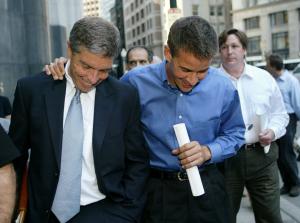|
Issue Date: September 19, 2003 O’Malley key to settlement, says attorneys By JOE FEUERHERD At 6 p.m. Sunday, Sept. 7, Boston’s new archbishop, Sean O’Malley, sat down at a the small conference table in the Brockton offices of mediator Paul Finn, the man charged with bringing victims of clerical sexual abuse, their lawyers and the Boston archdiocese to an equitable settlement of more than 500 such cases pending against the church. O’Malley’s presence was a surprise. Attorney Roderick MacLeish would have dressed differently had he known the archbishop planned to attend -- a late afternoon oil change on his car left his shorts grease stained. The archbishop was surrounded by lawyers -- eight attorneys from the five firms that made up the steering committee for the plaintiffs’ many legal advisers. Seated next to O’Malley was attorney Thomas Hannigan, partner with the white-shoe law firm of Ropes and Grey. Under similar circumstances a decade ago, Hannigan worked with O’Malley to settle the infamous James Porter abuse cases in the neighboring Fall River diocese.
This time, however, the numbers were a lot larger, both in terms of victims and in the settlement they sought. An $85 million offer was on the table. The Sunday night meeting was to have occurred the previous day with O’Malley scheduled to attend. According to press reports, that meeting fell apart when the plaintiffs’ attorneys argued over who would attend and who would talk to the media. MacLeish said later that there was no such dispute -- simply a miscommunication among the lawyers. Whatever the case, it was an inauspicious beginning to O’Malley’s personal involvement in the highly charged mediation. But it was nothing new. There had been many fits and starts throughout the 18-month process. Previously, in 2002, then-Boston Cardinal Bernard Law had agreed to settle the case of the “Geoghan 86,” the victims of priest predator John Geoghan. That deal was rescinded when the archdiocese’s finance council balked at the $50 million price tag. The interim administration of Bishop Richard Lennon was equally frustrating, said Carmen Durso, an attorney representing 40 victims who had sued the archdiocese. Rumors of settlement offers abounded, but little was presented. No progress made. “It was nothing but contentious,” said Durso. Then O’Malley was installed and brought in a new team to get the deal done. “Hannigan moved immediately to start doing things -- after 18 months of people not doing anything,” said Durso. “We had a sense that [O’Malley] was a guy who was going to walk the walk as well as talk the talk.” Within a week of O’Malley’s assuming office in Boston, the archdiocese put a $55 million offer on the table. Talks continued. By the end of August the offer was up to $65 million. Still, thought MacLeish, the parties would not reach a settlement that Sunday evening. “We had too many issues that we were too far apart on,” said MacLeish. Not least were the financial concerns. “When you’re negotiating for clients you have an ethical and moral obligation to see that you get the best possible result for them,” said Durso. “You have to be absolutely sure that you’re not leaving any money on the table.” Other questions to be answered included: • Would the archdiocese pay the victims in a lump sum or over a 12-month period? The plaintiffs wanted the money up front. • Would the archdiocese agree that its counseling center would not share information about victims with archdiocesan staff or church attorneys? • Would the archdiocese not only agree to place abuse victims on the church review boards investigating abuse accusations, but actually bind itself to that commitment by placing that provision in the settlement document? O’Malley listened, asked questions, huddled with Hannigan, expressed concerns and occasionally excused himself to a private office where, presumably, he was phoning advisers to determine just how far he could go. On the financial issues, recalled Durso, the archbishop spoke plainly. “Our credit card is maxed out,” he told the group. “This is all I can offer you. We are close to putting the archdiocese in financial jeopardy.” Though it took some time, and some private consultations, said MacLeish, O’Malley committed to paying the awards in a lump sum. Said Durso: “We believed the archbishop when he said that’s all there is. We believed him partly because of the kind of person he is. He had listened to us and he had responded in a way we thought was sensitive to our concerns. And we understood what the limitations were.” Further, O’Malley agreed that the counseling center’s files would remain confidential and committed the archdiocese to placing an abuse victim on its review board. “There is not one document that I am aware of in any church settlement where a diocese has agreed to anything other than to pay money -- and that would not have settled these cases,” said MacLeish. “And the fact that he was willing to put them into a document with victims who had sued [the archdiocese] was truly unprecedented. “A great deal depended on the personality of Archbishop O’Malley,” said MacLeish. “I hope that there are more people like him in the church.” Joe Feuerherd is NCR Washington correspondent. His e-mail address is jfeuerherd@natcath.org.
National Catholic Reporter, September 19, 2003 |
